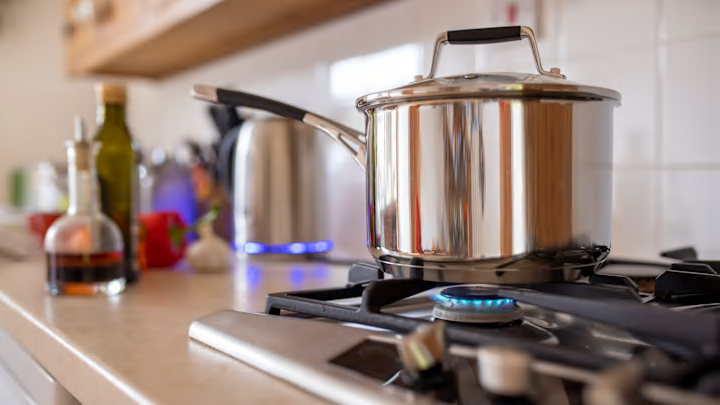It’s a debate as timeless as whether a hotdog is a sandwich or whether pineapple belongs on pizza. When it comes to cooking in the kitchen, which is truly better: gas or electric stoves?
Fans of the gas stove claim it heats up faster and offers superior temperature control compared to electric ranges, making it easier to cook multiple dishes at once. On the other hand, proponents of the electric stove contend that these appliances are generally safer and easier to maintain than gas ranges.
While there are definite pros and cons to each type of stove, Gothamist reports that scientists and chefs alike are now weighing in and consider electric ranges to be the best option for most homes. In this article, we’ll look at the reasons why and drill deeper into the benefits and disadvantages that each type offers.
Gas Stoves: How Hazardous Are They, Really?

Gas stoves are in more than 40 million homes across the U.S., but recent studies have shown that these appliances may be more hazardous to the environment and human health than once believed.
In a January 2022 study published in Environmental Science & Technology, researchers found that gas stoves emit a lot of methane—so much so that over a 20-year period, annual emissions from all the gas stoves in the U.S. had the same impact on the climate as the annual carbon dioxide emissions from 500,000 cars. Gas stoves also release benzene and nitrogen dioxide into the air, which could lead to respiratory diseases. In fact, a December 2022 study in the International Journal of Environmental Research and Public Health suggested that more than 12 percent of childhood asthma cases in the U.S. could be linked to gas stove use.
“Stoves leak small amounts of gas all the time, even when they are off. While these leaks are often too small to smell, they can still impact air quality and increase human health risks in our homes,” said Dr. Eric Lebel, senior scientist at PSE Healthy Energy and lead author of an October 2022 study on the indoor effects of unburned natural gas emissions from household appliances.
Concerns over gas stove emissions are now so high that in January 2023, the U.S. Consumer Product Safety Commission (CPSC) announced that it was looking into ways to reduce such indoor air-quality hazards and strengthen voluntary safety standards on new models. This news also came amid reports that the agency was considering a nationwide ban on gas stoves—something that CPSC chair Alexander Hoehn-Saric has since debunked. “[To] be clear, I am not looking to ban gas stoves and the CPSC has no proceeding to do so,” he said in a statement.
Aside from unwanted emissions, gas ranges—while often less expensive to run than electric stoves—can be pricey to install, especially if you have to add a new gas line. They can also be trickier to clean, which can be a sticking point for some shoppers.
Gas vs. Electric Stoves: Which Is Better for Cooking?

Compared to gas ranges, electric versions give off no gasses at all, which is one of the driving factors behind the push to replace them with electric models.
When it comes to the quality of the cooking experience, chefs are a bit more split along the gas vs. electric stove divide. Some maintain that gas cooking provides a higher-quality experience (namely, being able to cook faster and have more control over temperatures), but increasingly, others are lauding the benefits of induction ranges, a special type of electric stove that uses electromagnetism to heat up cookware more quickly than a standard coil model likely would.
For professional cooks, that’s a definite benefit. Anna Rossi, chef and host of The Chef’s Pantry, recently told NBC10 Boston that induction stoves are simultaneously more reliable and easier to clean than their gas and basic electric counterparts. “I find that nothing compares to induction,” Rossi said. “It has such a well-dispersed energy in how it heats the pan that it is very efficient.”
Energy efficiency is another big reason why many experts recommend induction ranges; while they’re often more expensive to purchase and install, Energy Star estimates that they’re about 5 to 10 percent more efficient than conventional electric stoves and about three times more efficient than gas models. “If the government is serious about the environment, they should subsidize induction stoves like they do with hybrid and electric cars,” chef Sia Pickett told Gothamist in a recent interview. “I switched to induction because I care about the environment.”
One possible drawback of the induction stove is that certain cookware can’t be used with it. Fortunately, there is a hack to test and see whether yours will work. To start, just flip your pan over and hold a magnet to the bottom to see if it sticks. If it does, your pan is ferromagnetic and can be safely used on induction stovetops.
Overall, cooking is a deeply cultural skill, and most folks often develop strong emotional connections to their preferred method. If someone learned to cook on a gas range, chances are high that they will retain a nostalgic fondness for that style. Yet for those looking to improve their indoor air quality and embrace more sustainable practices in the kitchen, electric ranges are a great alternative that's worth considering.
Discover More Fascinating Ways to Live Smarter:
A version of this article was originally published in 2023 and has been updated for 2024.
